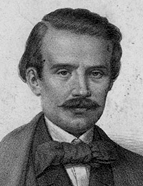

The Royal Academy of Sciences accepted Latino Coelho as a full member, and shortly afterwards, in 1856, he was unanimously appointed Secretary, later becoming Perpetual Secretary. The Academy entrusted him with overseeing the Dicionário da Língua Portuguesa [Dictionary of the Portuguese Language], using materials from Ramalho, which had been given to Alexandre Herculano and later sold to the Academy by the late historian.
Latino Coelho was also a peer of the realm and served as Minister of the Navy from July 1868 until August 1869. He participated in various committees, including one tasked with reforming the Lisbon Academy of Fine Arts. After distancing himself from the Regenerator Party, he drew closer to members of the Historic Party (1861-63) and later the Reformist Party. He even served as Minister of the Navy under the government of Sá da Bandeira and the administration of the Bishop of Viseu (1868–69). Eventually, he adopted republican ideals, believing they offered the best protection for various citizenship rights. He was also connected to the “ Clube dos Lunáticos ,” a group disillusioned with the traditional parties involved in the rotating system of government. During the First Spanish Republic (1873-74), Latino Coelho aligned himself with the Republican Democrat group, which included figures such as Oliveira Marreca, Sousa Brandão, and Bernardino Pinheiro. He co-authored a republican programme with Elias Garcia, which was published in the periodical A Democracia [Democracy] on 12 October 1873. He was affiliated with the Democratic Republican Centre, though he left it in 1878, and by 1883, he was a member of the Republican Party’s executive committee. In political assemblies, he was known for speaking with the utmost correctness and dignity, offering critiques while maintaining a noble demeanour — one of his most distinctive virtues. Respected by all the parties of the time, even within the monarchical regime he opposed, Latino Coelho had true admirers who praised both his human and intellectual qualities. He was a Commander of the Order of Christ, as well as a Grand Cross of the Tower and Sword and of Our Lady of the Conception.
